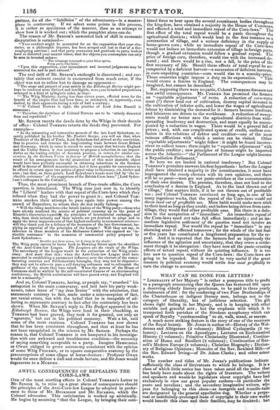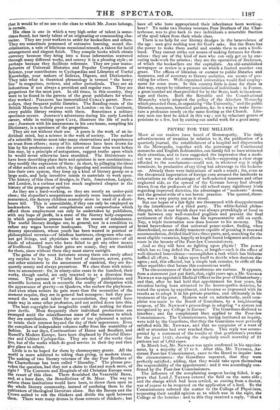WHAT CAN BE DONE FOR LETTERS?
"LIBERALITY of her Majesty" is rather a pompous title to prefix to a paragraph announcing that the Queen has bestowed 60/. upon a deserving elderly literary gentleman, to be paid in three yearly instalments of 201.: for the conferring of two Poor Brotherships of the Charterhouse on indigent literary men, belongs not to the category of liberality, but of judicious selection. The gift shows right feeling in her Majesty, and is in keeping with other amiable and graceful acts ; but the emphasis with which it is trumpeted forth partakes of the frivolous sycophancy which can speak of Royalty " condescending " to sit, walk, stand, or sneeze. A much more striking feature is the story of one of the receivers of the Royal bounty. Mr. JONES is author of—History of the Wal- denses and Albigenses (2 volumes); Biblical Cycloptedia (2 vo- lumes); Lectures on the Apocalypse ; Lectures on Ecclesiastical History (3 volumes); Primitive Christianity Illustrated ; Continu- ation of Hume and Smollett (4 volumes) ; Continuation of Rus- sell's Modern Europe (4 volumes); Christian Biography ; Diction- ary of Religious Opinions ; Memoirs of the Rev. Rowland Hill—of the Rev. Edward Irving—of Dr. Adam Clarke ; and other minor works.
The number and titles of Mr. JONES'S publications indicate sufficiently the class of litterateurs to which he belongs. It is a class of which little notice has been taken amid all the noise that has lately been made about therights of literature. The writers and speakers and would-be legislators about copyright have had exclusively in view our great popular authors—in particular the poets and novelists; and the secondary imaginative writers, who pass for belonging to this class—as mongrels and trundle-tails are designated by the general appellative dog. Whether a perpe- tual or indefinitely-prolonged lease of copyright in their own works would benefit this class and their families, may be doubted; but
that it would be of no use to the class to which Mr. JONES belongs, is certain.
His class is one in which a very high order of talent is some- times found, but rarely talent of an originating or commanding cha- racter. They are your workers to order for booksellers and others.
They are sometimes possessed of extensive learning, sound dis- crimination, a vein of felicitous occasional remark, a talent for lucid arrangement and elegant finish. They compile books which obtain currency because they bring into a focus information scattered through many different works, and convey it in a pleasing style ; or perhaps because they facilitate reference. They are your manu- facturers of Universal Histories and Popular Compendiums of Science, your contributors to Cyclopredias and Libraries of Useful Knowledge, your makers of Indexes, Digests, and Dictionaries. They take what in theatrical phraseology is termed " the heavy line' in magazines, reviews, and other periodicals. They are an industrious if not always a provident and regular race. They are gregarious for the most part. In old times, in this country, they were to be found in the garrets of the great publishers for whom they worked : FIELDING has immortalized Cuitu.'s garret. Now-
a-days' they frequent public libraries. The Reading-room of the British Museum is their great resort in London : on the Continent,
every public library swarms with them. Sometimes a solitary specimen occurs. JonNsms's adventures during his early London career, while in waiting upon CAVE, illustrate the life of such a one : Joawsow with his amanuenses in his own house, compiling his Dictionary, is a specimen of the gregarious.
They are not without their use. A poem is the work of an in- dividual mind, but a science is the work of society. The author of a scientific treatise must take many observations and experiences on trust from others ; many of his inferences have been drawn for him by his predecessors : even the errors of those who went before him may, by a principle of antagonism suggest truths upon which
he would never otherwise have stumbled. The litterateurs we have been describing place facts and opinions in new combinations ;
they modify the expression of them : in short, by pillaging the ideas of older authors and each other, by digesting and assimilating them into their own system, they keep up a kind of literary gossip on a large scale, and help inventive minds to materials to work upon. The history of this class of drudges, in Paris, Amsterdam, Leipzic, and London is a curious and too much neglected chapter in the history of the progress of opinion. As they are a bard-working, so they are mostly an under-paid class; the slopseller's sempstresses scarcely more inadequately re- munerated, the factory children scarcely more in need of a short- hours bill. This is unavoidable, if they can only be employed as bookmakers. The useful compilations and compendiums which afford them employment can only be undertaken by publishers, with any hope of profit, in a state of the literary body-corporate in which population presses hard on the means of subsistence.
The useful literary drudges are in general, not in a condition to refuse any wages however inadequate. They are composed of dreamy speculators, whose youth has been wasted in poetical or philosophical reveries—of briefless barristers, clergymen who can- not get livings, and physicians who cannot get patients—of all kinds of educated men who have failed to get any other means of livelihood. Though their gains are scanty, they are thankful for them, since without them they must starve outright. The gains of the most fortunate among them can rarely afford any surplus to lay by. Like the herd of dancers, actors, poets, and other ministers to the amusement of mankind, they are fre- quently scanty and always precarious. We class them with minis- ters to amusement : for, in ninety-nine cases in the hundred, their works, though useful, are only resorted to as a diversion from ennui. The patrons of "Useful Knowledge" publications and scientific lectures seek to reconcile the reality of dissipation with the appearance of gravity—as Quakers, who eschew the playhouse. And even when writers do gain more than the necessities of the moment require, they are in general bad managers : had they pos- sessed the taste and talent for accumulation, they would have made way in some other profession, and not settled down into this. The best copyright-law imaginable could do nothing for these poor devils. Most frequently their individual productions are swamped amid the miscellaneous mass of the volumes to which they are contributors. Often they are of too ephemeral a nature to retain their interest beyond the day of their appearance. Even the compilers of independent volumes suffer from the mutability of fashion. In our days, Continuations of Hume and Smollett, and Russell's Modern Europe, have been displaced by Pictorial Histo- ries and Cabinet Cycloptedias. They are not of the works that live, but of the works which do good service in their day and then give place to others. Little is to be hoped for them by eleemosynary grants. All the world is more addicted to taking than giving, in modern times. The making of two literary veterans of the day Poor Brothers of the Charterhouse has been called "liberality." The phrase pro- vokes the question, had they not a claim to that and much more, of right ? The Convents and Hospitals of old Christian Europe were the resort of this class. There flourished the Venerable BEDE, and, at a later date, the Benedictines of St. Maur. The way to reform these institutions would have been, to throw them open to the whole literary community, instead of confining them to the Cultivators of theological literature alone. But the Barons and the Crown united to rob the thinkers and divide the spoil between them. There were many drones in those retreats of thinkers; but
have all who have appropriated their inheritance been working- bees ? To make two literary veterans Poor Brothers of the Char- terhouse, was to give back to two individuals a miserable fraction of the spoil taken from their -whole class.
There is no help for our literary drudges in the benevolence of the age : men give nothing now for God's sake. But the State has the power to make them useful and enable them to earn a liveli- hood. They cannot strike out means of making fortunes for them- selves : they are of the kind of men who can only get on by exe- cuting task-work for salaries ; they are the operatives of literature, of which the booksellers are the capitalists. An old-established newspaper or review is a pasture on which a limited number can graze. The offices of librarian or curator to public libraries and museums, and of secretary to literary societies, are means of pro- viding for others. Well-organized universities would find employ- ment for some more. In this country little is done for them in that way, except by voluntary associations of individuals : in France, a great number are thus provided for by the State, both to its advan- tage and theirs. Both the Republic and the Constitutional Monarchy wisely adopted the policy of the Absolute Monarchy which preceded them, in organizing "the University," and the public libraries, museums, botanical gardens, &c. in a way to make litera- ture a profession nearly on the same footing as the Church. Lite- rary men can best be aided in this way ; not by reluctant grants of' pensions to a few, but by cutting out useful work for a good many.



























 Previous page
Previous page